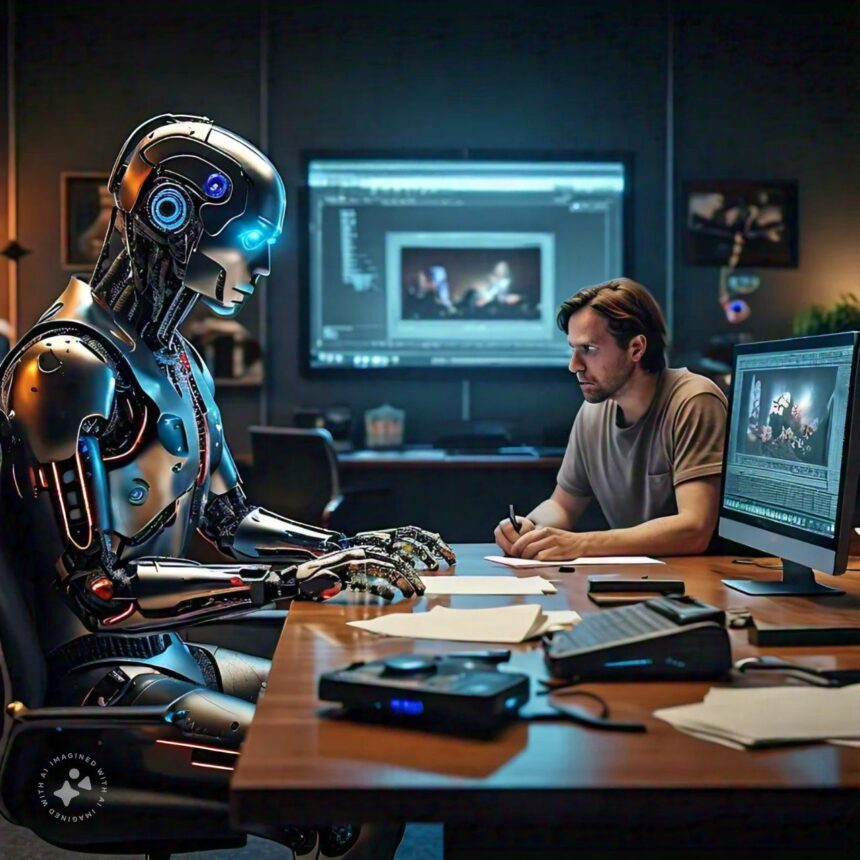Artificial Intelligence (AI) has made remarkable progress over the past decade, reshaping industries from healthcare to marketing. The creative arts, including the film industry, are no exception. AI’s ability to assist with tasks traditionally thought to require a human touch, such as storytelling, has sparked a heated debate: could AI replace human film scriptwriters in the future? While some see AI as a tool to complement human creativity, others fear it might render human scriptwriters obsolete.
Current Role of AI in Screenwriting
Today, AI tools are increasingly being used as creative partners in the screenwriting process rather than outright replacements. Many writers now use AI for storytelling—leveraging advanced tools to brainstorm ideas, shape plotlines, and craft realistic dialogue. Platforms like ScriptBook analyze existing scripts and offer data-driven insights into story structure, character arcs, and audience engagement, helping writers strengthen their drafts with greater precision and confidence.
AI has also ventured into creating entire scripts autonomously. Films like Sunspring, a short film written by AI, have demonstrated the technology’s ability to craft coherent narratives. However, the reception of such works has been mixed. While they showcase AI’s potential, the stories often lack the emotional depth and subtlety that human writers naturally bring to their work.
Advantages of AI in Scriptwriting
The potential advantages of using AI in scriptwriting are significant. Firstly, AI can produce scripts at an unprecedented speed. What might take a human writer months to draft, an AI can generate in hours. This efficiency could revolutionise production timelines, enabling studios to create content more rapidly in response to market demands.
Secondly, AI can reduce costs associated with script development. Hiring a team of writers can be expensive, particularly for smaller studios or independent filmmakers. AI offers a more affordable alternative, providing producers with a first draft to build upon, saving both time and resources.
Limitations and Challenges
Despite these advantages, there are significant limitations to AI’s ability to replace human scriptwriters. Chief among these is creativity. AI can generate stories based on existing patterns and data, but it struggles to produce the originality and emotional nuance that define great screenwriting. The ability to create characters with genuine depth and explore complex themes remains uniquely human.
Ethical and legal challenges also loom large. Intellectual property rights for AI-generated content are still unclear. If an AI writes a script, who owns it—the creator of the AI, the studio, or the person who commissioned the work? Additionally, concerns about bias in AI algorithms, which are trained on existing data, could perpetuate stereotypes or exclude diverse voices from storytelling.
Industry Perspectives
The rise of AI in screenwriting has understandably caused anxiety among professional writers. Many fear that studios, motivated by cost-cutting, might prioritise AI over human talent, resulting in a loss of jobs and a decline in script quality. These concerns were underscored during recent strikes by Hollywood writers, who demanded safeguards against the unchecked use of AI in creative roles.
However, not all industry stakeholders share these fears. Producers and studios often view AI as a valuable tool rather than a replacement for human scriptwriters. For them, AI’s role is to enhance productivity and provide fresh ideas, not to replace the human touch that audiences expect from compelling films.
AI’s Broader Capabilities
AI’s applications extend far beyond screenwriting. The technology has already been used to create realistic visual effects, automate editing processes, and even generate virtual characters. Some of its capabilities, like generating ‘AI nudes‘—which can depict people in highly realistic yet entirely fabricated scenarios—showcase the broader reach of AI in the creative industries. Such advancements highlight the immense potential of AI but also underline the need for ethical oversight.
Future Outlook
Looking ahead, the most likely scenario is one of collaboration rather than replacement. AI and human scriptwriters could work together to produce stories that blend the best of both worlds. AI might handle routine tasks like drafting dialogue or structuring scenes, leaving human writers to infuse scripts with emotion, originality, and cultural context.
Preserving the human touch in storytelling is crucial. While AI can analyse and mimic patterns, it lacks the lived experiences, imagination, and intuition that make human creativity so special. The challenge for the industry will be to embrace technological advancements without losing sight of the artistic essence that defines film as a medium.
AI is undoubtedly transforming the film industry, offering new tools to streamline scriptwriting and reduce costs. However, its limitations in creativity and the ethical questions it raises make it unlikely to replace human scriptwriters entirely. Instead, the future of storytelling will depend on finding the right balance—leveraging AI to enhance productivity while preserving the artistry and emotional depth that only humans can provide.


